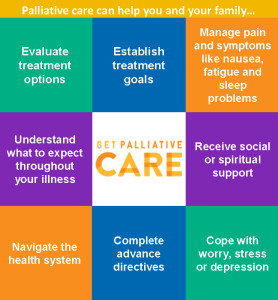 How to find help if you are caring for a loved one during any stage of a serious illness
How to find help if you are caring for a loved one during any stage of a serious illness
Guest article by Diane E. Meier, MD
If you are caring for someone with a serious medical condition, you already know the enormous impact it can have on your daily life—from managing doctors’ appointments and medications to dealing with physical and emotional stress. What you may not know is just how palliative care can benefit you and your loved ones.
Palliative care provides a wide range of benefits that help patients, caregivers and their families have the best possible quality of life while living with a serious illness. Palliative care is beneficial at any stage of a serious illness, and you can have it along with curative treatment.
As a doctor and palliative care specialist at Mount Sinai Hospital in New York, I work with a team of nurses, pharmacists, nutritionists, chaplains, and others. Together we partner with each patient’s primary physician to help relieve suffering by managing pain, symptoms and stress. The palliative care team provides an extra layer of support for both the patient and the family.
Despite its numerous benefits, many patients and caregivers don’t know about palliative care and what it can do. Let’s take a look at some of the most common questions…
Q. What is palliative care?
A. Palliative care (pronounced pal-lee-uh-tiv) is specialized medical care for people with serious illnesses. It is focused on providing patients with relief from the symptoms, pain, and stress of a serious illness—whatever the diagnosis. The goal is to improve quality of life for both the patient and the family.
Palliative care is provided by a team of doctors, nurses, and other specialists who work together with a patent’s other doctors to provide an extra layer of support. It is appropriate at any age and at any stage in a serious illness and can be provided along with curative treatment.
Q. Is palliative care only available for older patients?
A: Palliative care is important at any point in a serious illness and for patients of any age. Patients can ask about palliative at the same time they are diagnosed and initially treated.
Q. Is palliative care covered by health insurance?
A. Most insurance plans, including Medicare and Medicaid, cover palliative care.
Q. Do you have to give up your own doctor?
A. No. The specialists who make up the palliative care team work together with your primary doctor.
Q. Can you have palliative care together with curative treatment?
A. Yes. Palliative care can be given along with life-prolonging treatments, and it is appropriate at any stage in serious illness.
Now that you know the facts about palliative care, I hope you’ll speak with your doctor and other health care professionals about bringing in the palliative care team for a consult. You can also visit GetPalliativeCare.org to learn more and locate a hospital in your area that provide palliative care.
Diane Meier, MD is Director of the Center to Advance Palliative Care (CAPC), a national organization devoted to increasing the number and quality of palliative care programs in the United States. Dr. Meier has worked at Mount Sinai Hospital in New York City for over 30 years. She is dedicated to helping patients and their caregivers have the best possible quality of life in the face of any type of illness.









